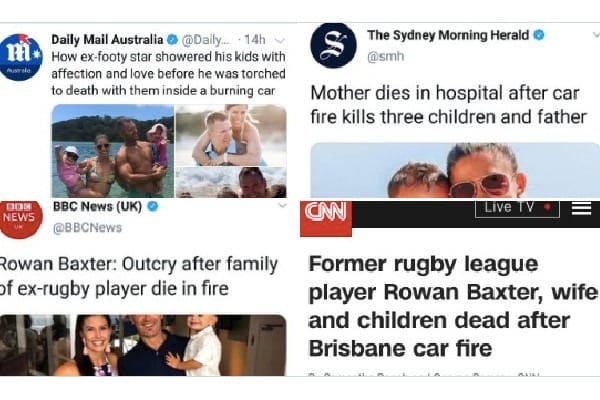“Ex-Warrior at centre of car fire ‘horror’ Rowan Baxter was brother of NZ sevens star Charles Baxter.”
“‘Chin up Bro’: A friend’s chilling last post to dad-of-three who burned to death with his children”.
These were among the first headlines last week when a man murdered his young children and his former partner by setting fire to the car they were in. Some media reported the incident as if the father was also a victim, noting his sporting history, and sharing photos of him as a “loving father”.
The following day, a senior Queensland detective addressed the media and said that the police were “keeping an open mind” and understood the public may be speculating on whether this was a case of a “husband being driven too far”. To their credit, the Queensland Police recognised the words, even if clumsy and unintentional, had done harm and removed the officer from the investigation.
Words matter. Reporting by the media or the police that minimises the role of the perpetrators, that portrays murderers as ‘just good men who are hurting’, contributes to the culture of violence. Significantly, it deters those women and children at risk from family violence from coming forward.
Guidance on how to report sensitively and accurately on family violence is readily available. The Press Council and Commercial Radio Australia, among others, have adopted advisory guidelines.
Specialist service, Our Watch, has developed media guidelines. In response to the backlash at the appalling framing of initial reports, most outlets altered headlines and re-wrote stories to reflect that Rowan Baxter was solely responsible for the violent crime that killed his family.
It shouldn’t take a rewrite. The media is complicit in shaping how society views family violence, and how safe women feel to leave abusive relationships. This week I will ask the Senate to call for stronger, enforceable guidelines on reporting family violence to remind the media of this responsibility.
This week I will also call for an urgent crisis response to the number of women killed by violence. There have now been nine women killed by violence in 2020, after 61 were murdered last year.
Yet this government has shown a greater sense of urgency in response to a needle in a strawberry or an isolated shark attack.
Every sitting fortnight I move a motion in the federal parliament counting the number of women killed by violence. Every time, that number has increased.
Every time the motion calls for the government to properly fund frontline domestic violence services, to fund prevention programs. The funds allocated under the National Action Plan for Elimination of Violence Against Women are woefully inadequate and far less than expert services are telling us is needed to address the crisis.
In fact, the government has recently cut funding to some critical frontline services, such as the National Family Violence Prevention Legal Services Forum and the Safe Phones for Women program.
Every time the motion calls on the government to publicise a national toll of women killed by violence. Like the road toll, this would keep this issue in the public eye and contribute to changing the culture that allows it to continue. I’ve written twice to Minister for Women Marise Payne seeking support for this initiative, but have received no response.
Every sitting fortnight, my motion passes without a vote, and every time the government continues to do nothing.
What’s it going to take before we see real action from this Government to stop the epidemic of violence against women and children?
We will never forget these precious little lives lost and their dear mother Hannah Clarke, nor all the other women and children killed by men.
Support is available for those who may be distressed by phoning Lifeline 13 11 14; Mensline 1300 789 978; Kids Helpline 1800 551 800; beyondblue 1300 224 636.
If you or someone you know is impacted by family violence, call 1800RESPECT on 1800 737 732 or visit www.1800RESPECT.org.au
In an emergency, call 000.


